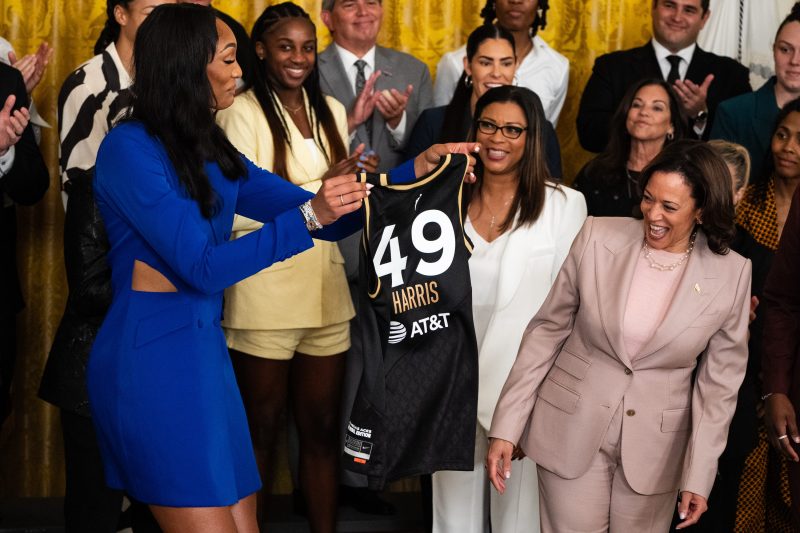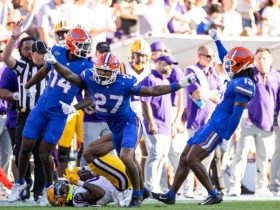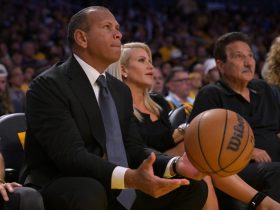It was August of 2023 when a basketball star and a possible future president of the United States had a moment that was heartfelt and also a possible indication of what’s to come.
The Las Vegas Aces were at the White House celebrating their championship win with President Joe Biden and Vice President Kamala Harris. Harris came to the podium to speak but before beginning, she turned to forward A’ja Wilson and said: ‘My soror.’
Wilson and Harris are members of the historic Alpha Kappa Alpha Sorority, Inc., a Black service organization and sorority founded at Howard University in 1908.
After Harris spoke to Wilson, it was Wilson who responded with ‘Skee Wee,’ which can mean many things but it’s mostly a form of acknowledgement, care and love.
‘I couldn’t help it,’ Harris said, referring to greeting her fellow soror.
That moment wouldn’t be the last time the two would closely communicate.
In February, they filmed an Instagram video discussing the importance of the upcoming presidential election with Harris telling Wilson that democracy was at stake. The Instagram caption from Wilson read: ‘Creating change is a team effort! Make sure you’re registered to vote and this November, let your voice be heard.’
Whether you agree with their politics is irrelevant. The point is there’s already connective tissue between political activism in the WNBA and the greatest social justice issues of our time. If you don’t think that will continue now, at one of the most important moments in American history, you don’t know the history of the WNBA.
It’s not exactly known how many WNBA players support Harris and it’s important to note that Black voters aren’t a monolith. But if the majority-Black league follows the general pattern of Black women voters, Harris could have a potent force fighting for her. An NBC News exit poll showed that 90% of Black women voted for Biden in 2020.
Harris isn’t a stranger around the WNBA. She was there when Brittney Griner played in her first WNBA game after being released by Russia. In April, Harris name-checked the WNBA when talking about equal pay for women.
‘Women should be paid their fair share. Whether they’re a scientist, construction worker, or WNBA All-Star,’ Harris wrote on social media. ‘President Biden and I are committed to closing the gender wage gap and creating an economy where every American can thrive.’
All of this means the league could be a huge mobilizing force for Harris not just with women but young people in general.
It’s unlikely the WNBA sticks to sports. It’s unlikely they shut up and dribble. It is likely some players put their energy behind Harris because righteous activism is in the WNBA’s genome. These are players, and this is a league, that believe in Democracy and civil rights. How do I know this? They’ve fought for these things many times before. Perhaps more than any league in the history of American sports.
Years before Colin Kaepernick would take a knee to protest police brutality, the WNBA was in that space. In 2016, they were among the first to wear ‘Black Lives Matter’ shirts before games. WNBA players were fixtures at various protests. In 2020, the league dedicated its season to honoring Breonna Taylor, who was killed in a botched police raid.
“We have always been at the forefront of initiatives with strong support of #BlackLivesMatter, #SayHerName, the LGBTQ+ community, gun control, voting rights, #MeToo, mental health and the list goes on,” said WNBPA President Nneka Ogwumike in 2020. “This is not only necessary from a humanitarian perspective, but it may be one of the biggest opportunities that this league has and will ever have.”
In 2021, the Atlanta Dream and Phoenix Mercury helped introduce the nation to Sen. Raphael Warnock. Players wore shirts in pre-game with the words “VOTE WARNOCK. What the Dream would go on to do in supporting Warnock is one of the great political chef’s kisses of athlete activism.
Dream players disliked the person who co-owned the team, Kelly Loeffler, because she was MAGA. And insulting. And other things. So the players backed Warnock. The result was nothing short of stunning.
Warnock won his runoff election against Loeffler, becoming Georgia’s first Black senator. His win, along with Jon Ossoff’s, flipped Georgia blue. It’s true, as Time.com noted then, that other factors helped Warnock win. Yet an expert in political science and quantitative methods at Yale concluded that the WNBA helped raise awareness to those unfamiliar with Warnock.
Guard Tiffany Hayes, who played for the Dream then and who’s now with the Aces, said at the time: “We were definitely the loudest voice. We were the sternest voice. And we backed what we said. I don’t see any other hand that was bigger.”
The story of Warnock has become almost a sort of lore and retelling it is important because of the moment we’re in now.
Because if the Dream, and by extension many in the WNBA, fought to elect the first Black senator from Georgia, what do you think some WNBA players will do to help elect the first Black woman president?






